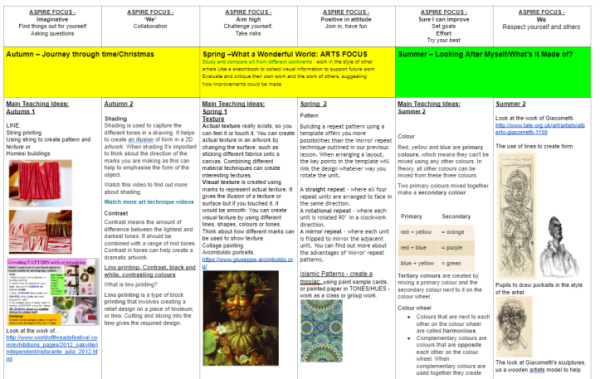Curriculum
ASPIRE Curriculum
Never settle for less than your best!
At Colley Lane Primary Academy, we ‘never settle for less than our best’ with our broad and balanced, challenging curriculum to meet the needs of our school and community. Our children leave Colley Lane prepared for the next stage of their educational journey and are provided with the cultural capital to ensure that they succeed in life.
Here you will find information about our school’s curriculum for key stage 1 and 2. We follow the National Curriculum. The content of the curriculum we follow in each year group for every subject is located on the individual subject page. The names of the phonics and reading schemes we use are located on the reading and phonics page. For our early year’s curriculum, please look at our Reception and Nursery pages.
Find out more about our WAT ASPIRE curriculum below.
ASPIRE Curriculum Overview 2022/2023
WAT ASPIRE Curriculum
WAT Moral Purpose
‘To unlock students academic and personal potential’
Our Aspire Curriculum Motto
‘Our aspirations are our possibilities, believe you can and you will!’
Our Aspire 2020 Curriculum Journey
WAT’s Aspire Curriculum has been co-constructed by leaders and staff from across our family of schools. Over the last few years, we have sharpened the content so that it is ambitious, challenging and exciting for all pupils. Each time the next curriculum theme comes into cycle, our staff work together in trust-wide year groups to evaluate previous learning and further develop future theme content. This powerful cycle of collaboration has put curriculum development and subject knowledge at the heart of school life.
It has been designed to give our young people the knowledge, skills, understanding and experiences to be successful in learning and in life. We have used some of the critical research in cognitive science to help underpin our approach. For example, the use of interleaving and retrieval practice to help pupils’ retention of knowledge.
How is the Aspire curriculum designed?
The Aspire curriculum has 6 different themes across the academic year. Four themes are planned trust-wide and two themes are school led. Each theme has a lead subject with other subject foci within the same theme. Other subject links are only made where the subject content is not diluted.
We took the decision for the following subjects to be taught discretely: Mathematics, aspects of English, Science, RE, PSHE, MFL and Computing.
The aim of the lead subject theme is to inspire pupils and deeply immerse them in subject content so that key knowledge sticks in their long-term memory. As each term progresses key knowledge and skills will be re-visited through a variety of methods. Consideration has been given to progression from theme to theme and within themes.
What is the golden thread within our curriculum themes?
We were conscious that the primary curriculum content in the past has too often become diluted through all encompassing topics. Consequently, we have created a golden thread focus to ensure that subject content is precise, rich and intentionally focused upon throughout the theme.
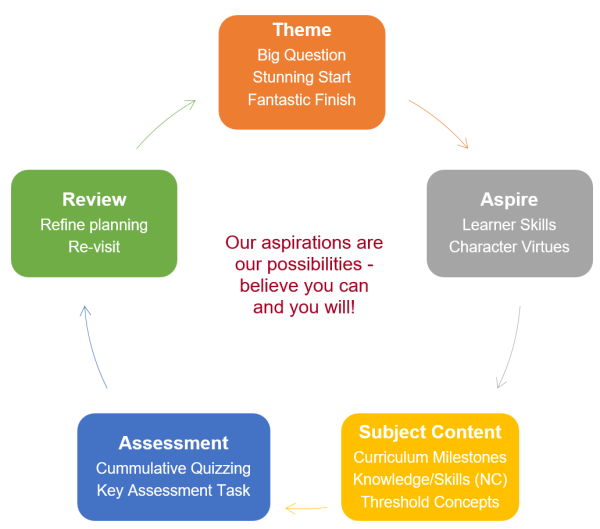
Each theme always starts with a big question to be clear about what children will be able to confidently and competently answer by the end of the theme. The big question links explicitly to the threshold concept/s for each theme. The threshold concepts are akin to a portal - they open up new or previously inaccessible ways of thinking.
Our curriculum subject milestone documents clearly set out the NC knowledge and skills alongside the threshold concepts. The knowledge and skills are smaller chunks of learning to help unlock students’ understanding of the threshold concept/s. We follow the NC as a minimum standard for breadth and balance and enhance it further through our big questions, threshold concepts and ambitious content.
The stunning start, fantastic finish and other rich experiences enable pupils to be excited about the curriculum and demonstrate learner skills and character virtues.
How does the Aspire Framework fit into the Aspire Curriculum?
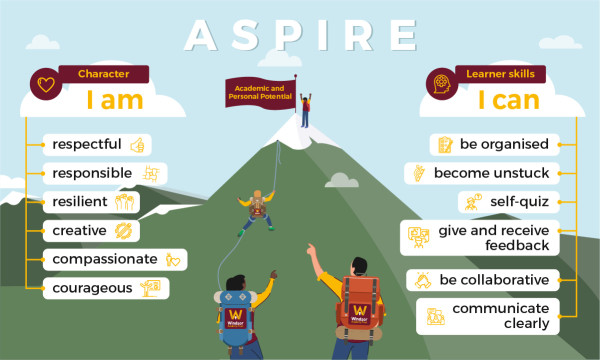
Our Aspire learning skills and character virtues are ‘caught, sought and taught’ throughout the curriculum. They are referenced explicitly in medium term planning where meaningful teaching opportunities arise. Part of our mission is to ensure that our youngsters have the metacognitive skills (learning to learn) to be successful in learning and in life. For example, pupils learn to ‘self-quiz’ to remember key bits of knowledge in history, or they practise ‘communicating clearly’ and ‘being courageous’ when presenting to an audience in the fantastic finish for the theme.
What does our medium term planning look like?
The medium term plans have set out the end-point knowledge required for each theme. This is depicted by the NC knowledge and skills but more importantly the threshold concepts and big questions. Consideration has been given to the order of when content is taught, so that there is progression. Activities are planned to help develop pupils’ knowledge and challenge their thinking.
Medium term planning structure:
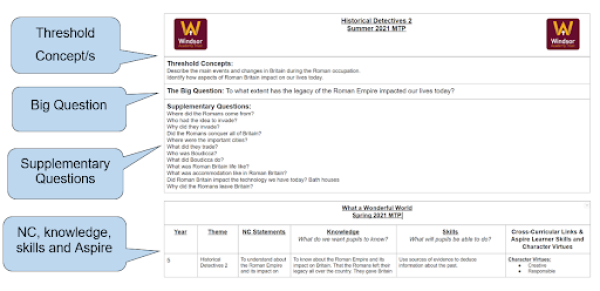
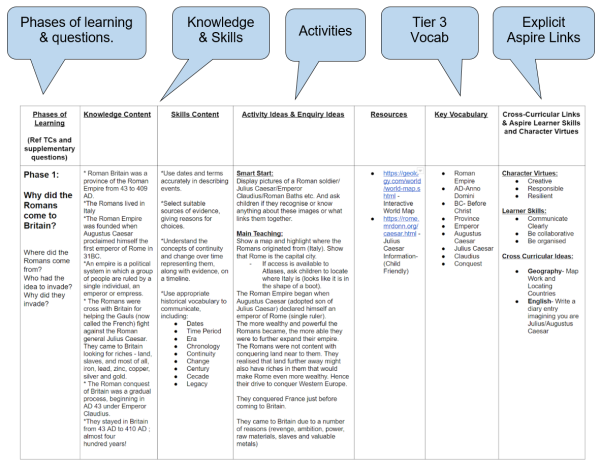 While the themes have trust-wide medium terms plans, it is currently schools’ responsibility to ensure effective curriculum planning is in place for subjects taught discretely. Other trust-wide plans have been produced for art and music aligned to the Aspire curriculum. Examples are shown:
While the themes have trust-wide medium terms plans, it is currently schools’ responsibility to ensure effective curriculum planning is in place for subjects taught discretely. Other trust-wide plans have been produced for art and music aligned to the Aspire curriculum. Examples are shown:
How are knowledge organisers used?
‘The real power of knowledge organisers is that they make us think hard about what we are going to teach.’ Mary Myatt, The Curriculum: Gallimaufry to Coherence
Knowledge organisers are in place for each of the Aspire themes. They give the ‘bigger picture’ of how the key knowledge links together. They make knowledge and language explicit, supporting planning, teaching and assessment. The content of the quizzes is selected from the knowledge organisers.
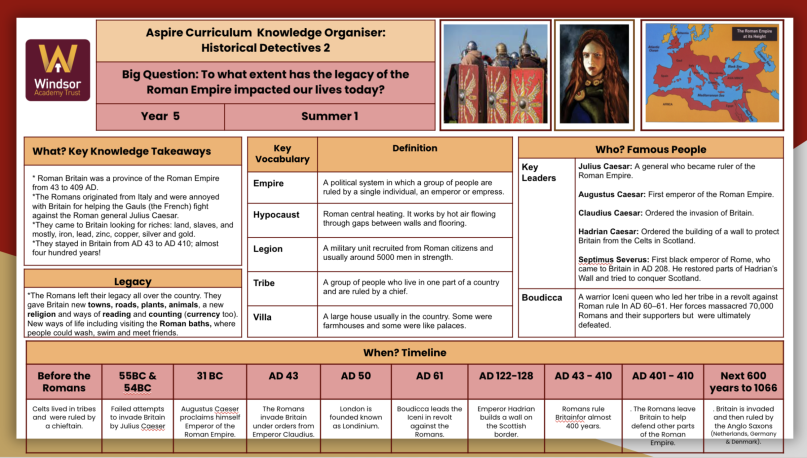
How will the curriculum be implemented?
Our curriculum intent will be implemented through ‘engaging, enthusing and inspiring every lesson, every day.’ Our WAT teaching and learning cycle, through which our ten teaching and learning principles are embedded, ensures that the curriculum is delivered effectively so that all students make progress regardless of background and ability.
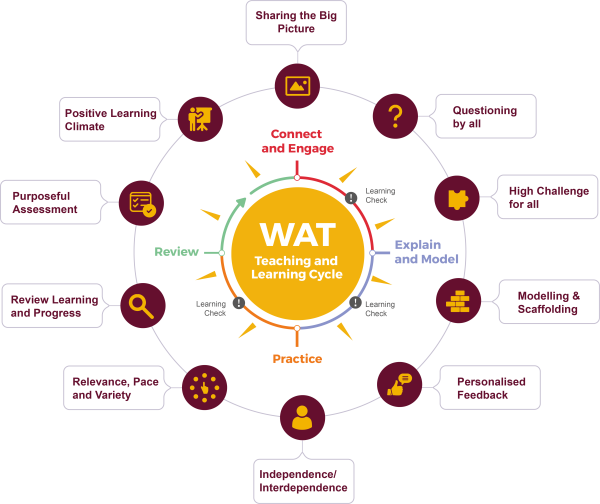
How does the teaching of English fit within the Aspire Curriculum?
There is a strong emphasis on planning for, teaching and using tier 3 vocabulary throughout the Aspire curriculum. Pupils are expected to know and understand the vocabulary needed to access the theme that they are learning.
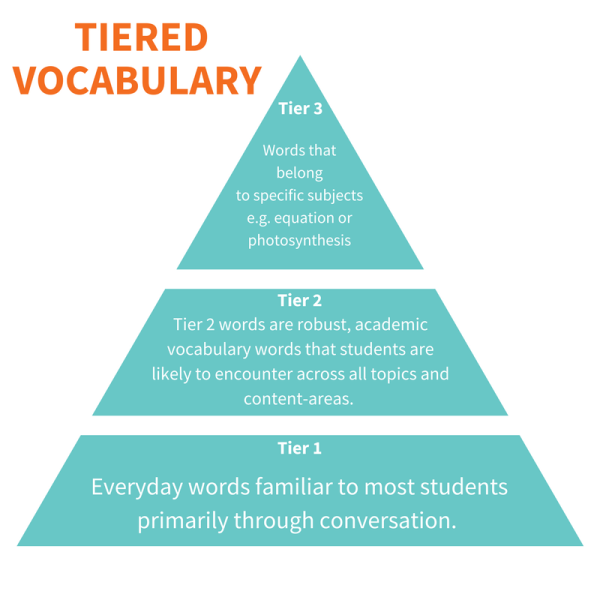 Opportunities for writing and reading across the curriculum developed in Aspire medium term planning. Whole-class reading is unlikely to match the Aspire curriculum and nor do we want it to. However, other reading opportunities can be exploited, particularly using non-fiction texts. This could also be a stimulus for the formal reading domain lesson.
Opportunities for writing and reading across the curriculum developed in Aspire medium term planning. Whole-class reading is unlikely to match the Aspire curriculum and nor do we want it to. However, other reading opportunities can be exploited, particularly using non-fiction texts. This could also be a stimulus for the formal reading domain lesson.
How do we assess the Aspire Curriculum?
Our approaches to assessing reading, writing and mathematics are robust, established and clear. We use a mixture of summative tests and teacher assessment to make accurate judgements of how well pupils are doing and where they need further support.
The new Education Inspection Framework (EIF 2019) makes it clear that assessment should support the teaching of the curriculum but not increase teacher workload. The handbook goes on to say that inspectors will evaluate whether collections of progress and attainment data are proportionate and sustainable.
Within the Aspire Curriculum there are two strands to the assessment delivered:
- Cumulative quizzes
- Key Assessment Task (KAT)
The teacher uses information gained in these processes to determine how to best use the additional assessment block weeks and to shape teaching in future themes.
Cumulative Quizzes inform the teacher about the impact of the current learning and demonstrate pupils’ retention of previous knowledge. They use closed questions. There are a range of ways to carry out cumulative quizzes, including using Google Forms. In the collaborative planning stage teachers, determine supplementary questions. The quiz questions are taken from these supplementary questions.
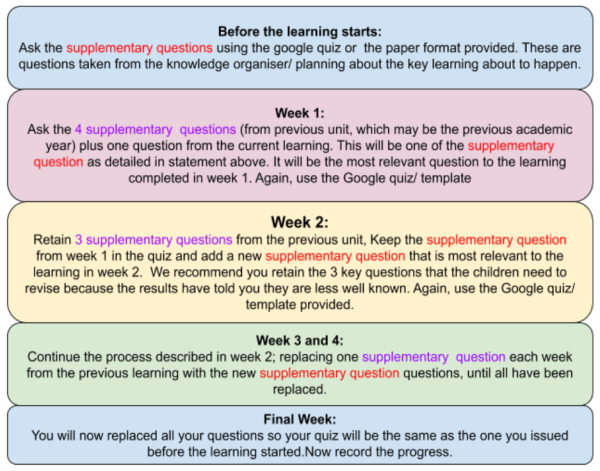 Key Assessment Task (KATs) allow the teacher to see how the knowledge and skills gained can be translated into understanding. These will be centred around a deep-thinking question, known as the ‘Big Question’ and will always be explicitly linked to the threshold concept/s. It must demonstrate pupils’ independent understanding of what they have learnt. For example: In Key Stage 2, this could be a written response to a question.
Key Assessment Task (KATs) allow the teacher to see how the knowledge and skills gained can be translated into understanding. These will be centred around a deep-thinking question, known as the ‘Big Question’ and will always be explicitly linked to the threshold concept/s. It must demonstrate pupils’ independent understanding of what they have learnt. For example: In Key Stage 2, this could be a written response to a question.
Our Aspire Curriculum Display
Purpose: To inspire pupils and support their learning across the theme. The Aspire curriculum display may have:
- Key questions
- Tier 3 vocabulary
- Key knowledge that needs to stick
- The journey of the theme as it progresses (stunning start to fantastic finish)
- High-quality examples of pupils’ work
- Subject specific resources, e.g. maps, artefacts, etc
- Subject text examples, e.g. non-fiction
How is the curriculum powered up by iPads for Learning?
Digital technology is used to power up the curriculum where meaningful opportunities arise. Year groups who have started to use iPads for Learning 121 devices map APPs and activities into the medium term planning. For example, pupils use Quizlet as an APP to self-quiz and support their retention of knowledge. You can see below an example of Year 4 planning where APPs have been explicitly embedded into the themes:
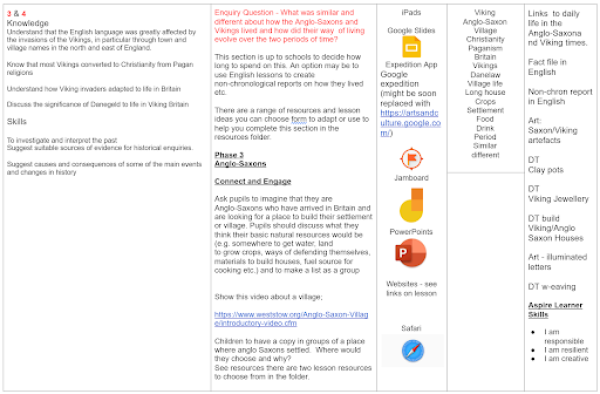
Our ongoing commitment to safeguarding is also reflected in the curriculum.
Promoting British values
The Department for Education states that there is a need: “To create and enforce a clear and rigorous expectation on all schools to promote the fundamental British values of democracy, the rule of law, individual liberty and mutual respect and tolerance of those with different faiths and beliefs”.
At Colley Lane Primary Academy, British values are at the centre of all that we do. We nurture our pupils so they become caring, responsible and tolerant adults who make a positive difference to British society and to the wider world. Through our ASPIRE values, we encourage pupils to be active, seek improvements, positive, independent, resilient individuals who always put effort into everything that they do.
British Values are promoted in other ways as outlined below:
Democracy
- Student Senate is elected by peers.
- Pupils are asked to share their views through student questionnaires and pupil voice interviews.
- The Student Senate share the views of the pupils within the school in regular meetings and are involved in decision-making processes.
- Pupils are taught how they can influence decision-making through the democratic process.
- The history of democracy is taught through themes such as The Greeks in Year 5.
- ‘Mock elections’ are held to reflect what is happening in modern-day Britain eg when there is a referendum or general election. Pupils learn how to debate and defend points of view.
- Pupils are taught how to express their views in all lessons, through the encouragement of reasoning.
Rule of law
- Our positive behaviour policy helps pupils to make good choices about their behaviour.
- Pupils are helped to distinguish right from wrong in the classroom, during assemblies and on the playground.
- Sanctions are used to encourage pupils to take ownership of their own behaviour.
- Through PSHE and other subjects, pupils are taught to respect the law and understand that living under the rule of law protects individuals.
- Pupils are taught about how religious law is different from criminal law through the regular teaching of a range of religions in Religious Education and in school assemblies.
Individual liberty
- Pupils are encouraged and given the freedom to make choices, knowing that they are in a safe and supportive environment.
- Pupils are taught to understand and exercise their rights and personal freedoms in a safe way e.g. in PSHE lessons.
- Pupils are given the opportunities to have key responsibilities in school for example by being a prefect, librarian, or digital leader.
- Pupils developing own self-discipline through adopting the ASPIRE values independently.
- Pupils are encouraged to take responsibility for their behaviour, as well as knowing their rights.
- Stereotypes are consistently challenged wherever they may occur in school.
- There is a strong anti-bullying culture at Colley Lane.
- Online safety lessons are taught as part of our computing curriculum.
Mutual respect and tolerance
- Respect is one of our three school rules.
- Pupils understand that respect is shown to everyone, both adults and children.
- We help them to develop an understanding of, and respect for, their own and other cultures through our thematic curriculum and Religious Education lessons.
- Staff and pupils challenge prejudicial or discriminatory behaviour.
- Links with local faith communities and visits to places of worship are promoted and people from different faiths are invited to the school to share their experiences in assemblies and in class.
- Through the PSHE and RE curriculum, pupils are encouraged to discuss and respect differences and similarities between people.
- Pupils are taught how to disagree in a respectful way.


